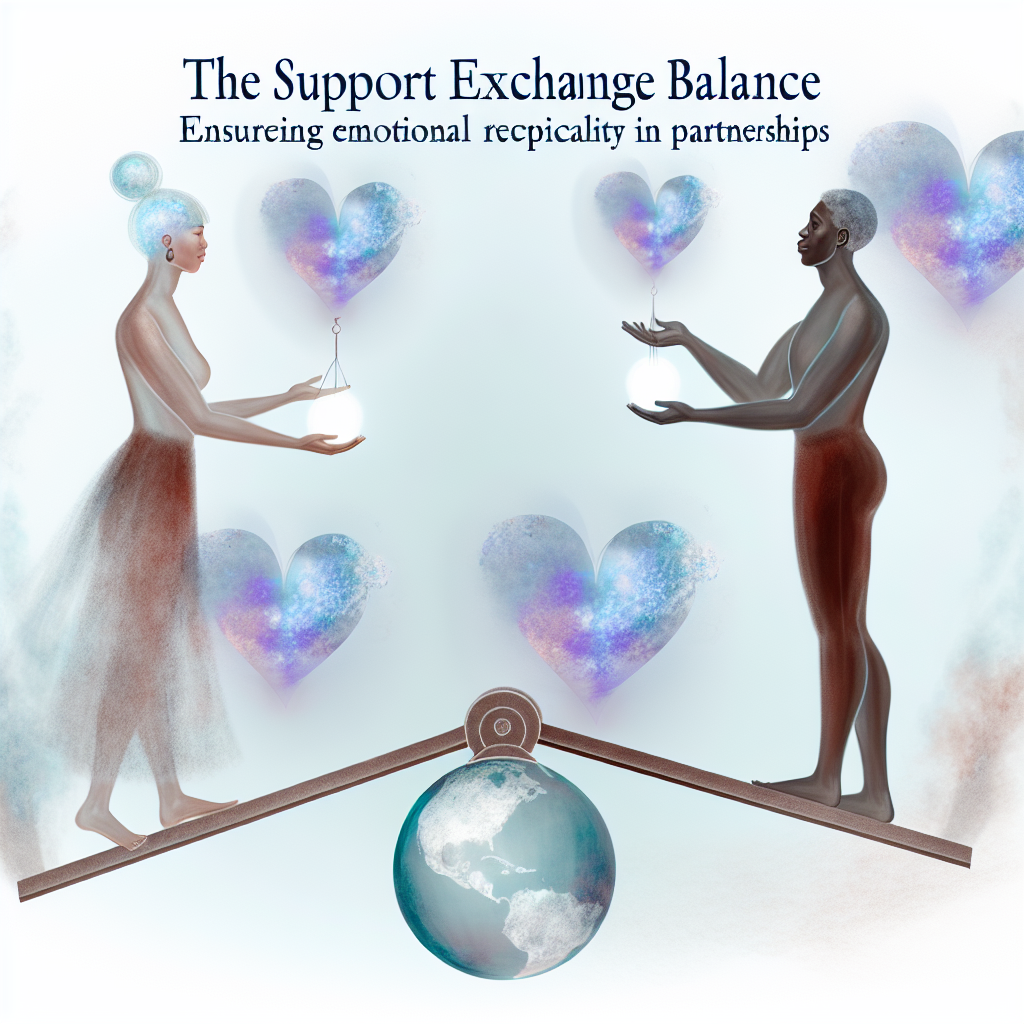The Support Exchange Balance: Ensuring Emotional Reciprocity in Partnerships
Introduction: Why Emotional Reciprocity Matters in Relationships
In any healthy and fulfilling romantic relationship, an essential element often overlooked is the balance of emotional support. It’s natural for one partner to lean on the other during times of stress, sadness, or uncertainty. However, when this dynamic becomes one-sided—where one partner consistently provides support without receiving it in return—the relationship can become strained, leading to emotional exhaustion and resentment.
Emotional reciprocity is the practice of mutual emotional support within a relationship. It ensures that both partners feel valued, heard, and understood. A balanced emotional exchange creates a strong foundation for intimacy and trust, allowing both individuals to thrive. However, when the scale tips too far in one direction, the consequences can be damaging. Studies have shown that chronic emotional imbalances in relationships are linked to increased stress, anxiety, and lower overall relationship satisfaction.
A common misconception in romantic partnerships is that support should be given selflessly without expecting anything in return. While generosity and compassion are fundamental, long-term emotional sustainability in a relationship hinges on an equitable exchange. Both partners must be willing to listen, empathize, and provide comfort in times of need. Likewise, each individual should feel comfortable seeking support without fear of being labeled needy, burdensome, or overly dependent.
The consequences of an emotional support imbalance can manifest in several harmful ways, including emotional burnout, communication breakdowns, or even the eventual dissolution of the partnership. Conversely, couples who engage in open and honest discussions about their needs tend to cultivate deeper emotional bonds, resilience, and overall relationship satisfaction.
In this article, we will explore the importance of emotional reciprocity in relationships, discussing strategies for fostering balance and reviewing psychological and medical research that supports this principle. Whether you’re in your early twenties or well into your senior years, understanding the dynamics of emotional support can make a significant difference in building a loving, stable, and mutually satisfying relationship.
The Science Behind Emotional Support in Relationships
Scientific studies in psychology and relationship dynamics emphasize the importance of mutual emotional support in maintaining healthy partnerships. Research from the American Psychological Association (APA) indicates that perceived emotional support is one of the greatest predictors of long-term relationship success. A study published in the Journal of Social and Personal Relationships found that couples who engage in reciprocal emotional exchanges experience higher relationship satisfaction and greater personal well-being (Reis, Clark, & Holmes, 2004).
One of the key psychological theories that apply to emotional support in relationships is Social Exchange Theory. This theory suggests that relationships function through a balance of costs and rewards. When individuals feel they are investing significantly more emotional energy than they are receiving, they may experience dissatisfaction, frustration, and a diminished sense of emotional security (Thibaut & Kelley, 1959). This imbalance, if prolonged, can lead to emotional exhaustion and disengagement.
Additionally, neuroscientific research supports the notion that healthy emotional interdependence benefits mental well-being. According to a study conducted by the University of California, Berkeley, and published in the Proceedings of the National Academy of Sciences, giving and receiving emotional support leads to increased activation in brain regions associated with stress relief, emotional regulation, and relationship bonding (Eisenberger & Cole, 2012). This scientific finding aligns with the concept that emotional reciprocity is not only beneficial to relationships but also critical to overall psychological health.
How Small Acts of Emotional Support Strengthen Relationships
From a clinical psychology perspective, Dr. John Gottman, a well-known relationship researcher, emphasizes the importance of “turning toward” one’s partner instead of turning away. In his work analyzing thousands of couples, he found that couples who consistently recognize and respond to one another’s emotional bids for support tend to have stronger, longer-lasting relationships (Gottman, 1994).
His research suggests that couples who engage in small, daily exchanges of emotional support—such as affirmation, active listening, and non-verbal gestures of care—create deposits in an “emotional bank account,” reinforcing relationship stability. When both partners contribute to this emotional reserve, it creates a buffer against difficult times and strengthens their overall emotional connection.
Moreover, clinical psychologists advocate for the necessity of boundaries and self-awareness in emotional give-and-take. Relationship counselors recommend that individuals check in with themselves regularly to assess whether they are feeling supported or overburdened. Communicating these concerns openly with a partner fosters a relationship dynamic that is both loving and mutually beneficial.
Practical Strategies for Maintaining Emotional Reciprocity
Fostering emotional reciprocity involves more than just understanding the psychology behind it. It requires active engagement and intentional actions in daily interactions with your partner. Here are some actionable strategies to ensure a well-balanced emotional exchange in your romantic relationship:
1. Be Mindful of Emotional Give-and-Take
Take note of who provides emotional support in your relationship and whether it feels mutually fulfilling. If you or your partner are feeling drained, it may be a sign of imbalance.
2. Express Your Needs Clearly
Open communication is the key to emotional reciprocity. If you need support, don’t hesitate to express it directly. Saying, “I’ve been feeling really stressed lately and could use some reassurance,” helps your partner understand your needs without ambiguity.
3. Practice Active Listening
True emotional support comes from listening without judgment or interruption. Give your partner your full attention, acknowledge their feelings, and validate their emotions instead of immediately offering solutions.
4. Make Emotional Support a Daily Practice
Small daily gestures—checking in with your partner, complimenting them, offering encouragement—help build a secure emotional foundation. These small acts accumulate over time to create a healthy emotional balance.
5. Set Boundaries to Prevent Emotional Burnout
Consistently supporting your partner emotionally is vital, but so is taking care of your own emotional well-being. Setting personal boundaries ensures that neither partner becomes emotionally depleted.
6. Recognize When Professional Help is Needed
If emotional imbalance has led to persistent issues in your relationship, seeking counseling or therapy can offer guidance on restoring equilibrium. A licensed therapist can help both partners navigate emotional needs more effectively.
Conclusion: Building Stronger Relationships Through Emotional Balance
The foundation of any strong romantic partnership lies in an equitable balance of emotional support. Without emotional reciprocity, relationships can become draining instead of fulfilling. Research in psychology, neuroscience, and relationship dynamics underscores the critical nature of mutual support in fostering emotional well-being and relationship stability.
By prioritizing open communication, active listening, and intentional efforts to maintain balance, couples across all age groups can ensure they are both giving and receiving the support they need. Whether you are just beginning a relationship or navigating a long-term partnership, recognizing and nurturing emotional reciprocity will contribute to greater intimacy, trust, and long-term happiness.
References
– Eisenberger, N. I., & Cole, S. W. (2012). Social neuroscience and health: Neurophysiological mechanisms linking social ties with physical health. Proceedings of the National Academy of Sciences, 109(Suppl 2), 17307–17310. https://www.pnas.org/
– Gottman, J. M. (1994). What Predicts Divorce? The Relationship Between Marital Processes and Marital Outcomes. Erlbaum.
– Reis, H. T., Clark, M. S., & Holmes, J. G. (2004). Perceived partner responsiveness as an organizing construct in the study of intimacy and closeness. Handbook of Closeness and Intimacy, 201-225.
– Thibaut, J. W., & Kelley, H. H. (1959). The Social Psychology of Groups. Wiley.
– American Psychological Association. (n.d.). The importance of social support. https://www.apa.org/topics/stress/social-support
In this article, we explored the importance of emotional reciprocity in romantic relationships. We discussed the science behind emotional support, how small acts can strengthen bonds, and practical strategies for maintaining balance. By prioritizing open communication, active listening, and intentional efforts, couples can cultivate greater intimacy, trust, and long-term happiness in their partnerships.

Dominic E. is a passionate filmmaker navigating the exciting intersection of art and science. By day, he delves into the complexities of the human body as a full-time medical writer, meticulously translating intricate medical concepts into accessible and engaging narratives. By night, he explores the boundless realm of cinematic storytelling, crafting narratives that evoke emotion and challenge perspectives. Film Student and Full-time Medical Writer for ContentVendor.com



